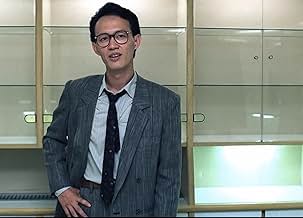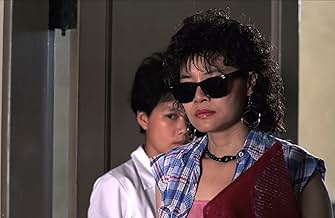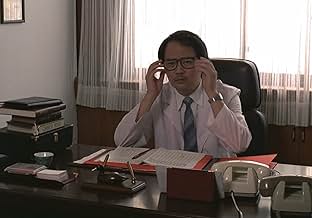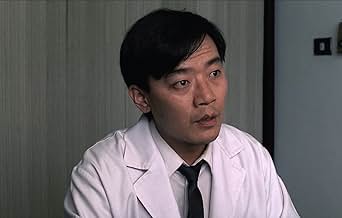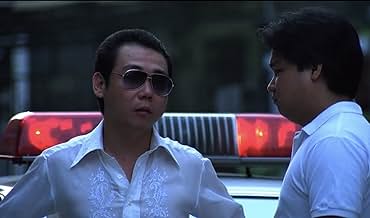IMDb-BEWERTUNG
7,7/10
5917
IHRE BEWERTUNG
Ein metaphysischer Krimi über das Leben dreier Paare in Taipeh, das sich über mehrere Wochen hinweg immer wieder überschneidet.Ein metaphysischer Krimi über das Leben dreier Paare in Taipeh, das sich über mehrere Wochen hinweg immer wieder überschneidet.Ein metaphysischer Krimi über das Leben dreier Paare in Taipeh, das sich über mehrere Wochen hinweg immer wieder überschneidet.
- Auszeichnungen
- 4 Gewinne & 2 Nominierungen insgesamt
Li-Chun Lee
- Li Lizhong
- (as Lichun Lee)
Yu An-Shun
- Da Shun
- (as An-Shun Yu)
Empfohlene Bewertungen
The Terrorizers is not on par with Yang's two most famous films - but it's pretty damn close. Melancholic throughout, all of the loosely connected characters are stricken by Antonioni-like ennui in a modernized, concrete Taipei, reflecting on lives that are heading in unwelcome directions. The ending(s) feel abrupt given the careful build-up, but the style and beauty of Yang's later gems are also displayed here.
It is unlikely that Edward Yang would quarrel with those who described him as the Antonioni of the East. But this kind of comparison is perhaps more damaging than helpful since it only engenders perceptions that have little or nothing to do with the filmmaker. If we are to understand Yang at all, we must allow his works to speak for themselves--they must succeed or fail on their own terms. "The Terrorizer" is one of Edward Yang's most accomplished works. In style, concerns, and methodology it differs significantly from the masterworks of Antonioni. Whereas Antonioni prefers to work with a narrower canvas, choosing to develop his characters until they achieve self-awareness, Yang seems to eschew such conventions, offering instead a logic akin to the dream world. "The Terrorizer" is indeed constructed very much like Chuang-Tzu's tale about a man who is unsure if he was dreaming that he was a butterfly or a butterfly who was dreaming that he was a man.
It would be a disservice to think that the ending of The Terrorizer is anything like O. Henry. It is perhaps more accurate to describe the ending as a faux denouement. The use of not a single but a double dream suggests that Yang is fully aware of his Chinese roots even when he is consciously quoting an outsider like Antonioni. It also indicates that he is less interested in the psychology of social behavior than in the actions taken by individuals and the effects they have on one another throughout the social network, regardless of their relations to each other. It is to this end that several couples in an unnamed metropolis of Taiwan are examined: a photographer and his girlfriend living off the wealth of their family; a teenage hustler and her pimp on a downward spiral of crime; an unhappily married novelist who embarks on an affair with a past lover. These three couples, in turn, are connected in some way, tangibly or peripherally, to a policeman, a law enforcer who is powerless to hold the city together, to keep it from coming apart. It is little wonder that everyone is constantly forging new relationships or alliances in a city where obsolescence is the rule.
Just as Antonioni uses dislocation as a means of conveying alienation, Yang chooses to use absentation--the absence of things--as a thematic device. Throughout the narrative one is reminded of the absence of fathers--both socially and politically. It is the absence of leadership. Elsewhere, absentation is employed when the photographer decides to turn an apartment into one huge darkroom which denies him the reality of time while permitting him to create a world of his own. At one point, a teenage girl whom he temporarily harbors asked him if it is day or night. When the camera finally peeps outside the apartment Yang gives us neither day nor night but that brief moment in time when light gives way to darkness or darkness breaks into light. It is here that Yang best captures the logic of that dream world: his protagonists are merely phantoms suspended in time. It is the absence of time. Throughout the narrative one is sometimes puzzled by the seemingly lack of explanations: the initial breakup of the photographer and his girlfriend (witnessed over the soundtrack of "Smoke Gets in Your Eye"); the return of the photographer's stolen cameras; the breakup of the married couple; the status of the policeman with no emotional or physical ties. It is the absence of elucidation. Unlike the works of Antonioni where there is always a central character whose viewpoint mirrors our own, functioning as a filter of reality, Yang denies us of such privilege. The impossibility of identifying with any character may be disorientating but it also serves as a metaphor of a city that has lost its moral compass. It is the absence of a central viewpoint. Absentation is clearly an effective tool in exploring the void that lies at the heart of modern culture--it is the black hole of the human condition.
When the film finally concludes it matters little what portion of it is real or a dream. Or for that matter who the dreamer really is. Fiction is perhaps no more than merely dreams, perfectly realized, and cinema the greatest dream machine ever built.
It would be a disservice to think that the ending of The Terrorizer is anything like O. Henry. It is perhaps more accurate to describe the ending as a faux denouement. The use of not a single but a double dream suggests that Yang is fully aware of his Chinese roots even when he is consciously quoting an outsider like Antonioni. It also indicates that he is less interested in the psychology of social behavior than in the actions taken by individuals and the effects they have on one another throughout the social network, regardless of their relations to each other. It is to this end that several couples in an unnamed metropolis of Taiwan are examined: a photographer and his girlfriend living off the wealth of their family; a teenage hustler and her pimp on a downward spiral of crime; an unhappily married novelist who embarks on an affair with a past lover. These three couples, in turn, are connected in some way, tangibly or peripherally, to a policeman, a law enforcer who is powerless to hold the city together, to keep it from coming apart. It is little wonder that everyone is constantly forging new relationships or alliances in a city where obsolescence is the rule.
Just as Antonioni uses dislocation as a means of conveying alienation, Yang chooses to use absentation--the absence of things--as a thematic device. Throughout the narrative one is reminded of the absence of fathers--both socially and politically. It is the absence of leadership. Elsewhere, absentation is employed when the photographer decides to turn an apartment into one huge darkroom which denies him the reality of time while permitting him to create a world of his own. At one point, a teenage girl whom he temporarily harbors asked him if it is day or night. When the camera finally peeps outside the apartment Yang gives us neither day nor night but that brief moment in time when light gives way to darkness or darkness breaks into light. It is here that Yang best captures the logic of that dream world: his protagonists are merely phantoms suspended in time. It is the absence of time. Throughout the narrative one is sometimes puzzled by the seemingly lack of explanations: the initial breakup of the photographer and his girlfriend (witnessed over the soundtrack of "Smoke Gets in Your Eye"); the return of the photographer's stolen cameras; the breakup of the married couple; the status of the policeman with no emotional or physical ties. It is the absence of elucidation. Unlike the works of Antonioni where there is always a central character whose viewpoint mirrors our own, functioning as a filter of reality, Yang denies us of such privilege. The impossibility of identifying with any character may be disorientating but it also serves as a metaphor of a city that has lost its moral compass. It is the absence of a central viewpoint. Absentation is clearly an effective tool in exploring the void that lies at the heart of modern culture--it is the black hole of the human condition.
When the film finally concludes it matters little what portion of it is real or a dream. Or for that matter who the dreamer really is. Fiction is perhaps no more than merely dreams, perfectly realized, and cinema the greatest dream machine ever built.
The opening film of this retrospective a few days ago, The Terrorizers was presented in a gorgeous restored digital transfer that is beautiful to gawk at every frame, and in essence what would have probably been seen during its first ever debut back in 1986. It's not cheap nor easy to have a film remastered and restored to get rid of pops, cackles and dirt, or to readjust its colour grading, as seen during the promotional clip on its restoration before the film proper, and it's really an excellent job done given the tremendous amount of effort behind the scene.
Edward Yang's third feature film, co-written with Hsiao Yeh, may have given the audience an ultimate red herring with an action oriented introduction complete with cops and robbers and a shootout, only for that to serve as just about the only real action sequence in this film that's steeped in what would be a relatively violent outcome by the time the end credits rolled. The Terrorizers tells a myriad of inter-weaving story lines involving a myriad of characters, such as Wang An's delinquent Eurasian girl who runs a call girl scam where she robs her clientele in hotel rooms and a photographer's obsession with her when he snaps her escape from the cops.
But the storyline that just begged for attention, is something similar like his first two films that dealt with the breakdown in relationships against the backdrop of modernity, and how modern life and its expectations chip at passion and romance, where couples rarely emerge unscathed from failure to communicate their true intentions. I suppose it is akin to the filmmaker's way of constant warning, given a trilogy now focused on this aspect, that to have emotions kept within oneself would only pave way for a massive blowout when the last straw is reached, and this offers no chance whatsoever for reconciliation, only destruction, and the humiliation that comes along with it.
We see it all coming from the first time the couple of Yue Fen (Cora Miao) and her husband Li Zhong (Lee Li Chun) got introduced, where the former's writer's block complaint becomes an avenue to be chided by her husband, who deemed her issue rather unimportant given that it is a work of fiction, and not life and death. Clearly this lack of sensitivity was the seed sowed, before a random cataclysmic event evolves this into her wanting to leave the matrimonial home for a place where she can get some escape and seek out inspiration, which turned out to be nothing more than seeking out an ex-lover to carry out an affair with.
While you may want to sympathize with the husband, wait. Edward Yang and Hsiao Yeh for some reasons crafted a number of characters here who are mostly lacking in morals. Li Zhong, eyeing a promotion which he thinks is a given with the death of his boss, goes to the extent of framing a fellow co-worker so that he can eliminate the competition for that move upwards, which makes him quite the bastard who gets his karmic just desserts through the infidelity of his wife, which ultimately humiliates the man who has to wear a green hat, and is without a defining career which he so highly prizes it as sort of a beacon in social stature.
One can imagine just who the real terrorizers are in the film - it's easy to point the fingers at criminals as depicted in the beginning of the film, or whoever is holding that gun to exact some form of revenge against pride, but clearly in this instance, it's really the female of the species who continue to torment emotionally especially when the silent treatment gets exacted, which I feel is possibly the cruelest form of torture to a loved one. The ending is much talked about, and in my opinion seemed to stem either as material from the fictional book that Yue Fen finally churned out, or an alternative reality which points to a consistently bleak outcome of that modern day grind in life.
Edward Yang's third feature film, co-written with Hsiao Yeh, may have given the audience an ultimate red herring with an action oriented introduction complete with cops and robbers and a shootout, only for that to serve as just about the only real action sequence in this film that's steeped in what would be a relatively violent outcome by the time the end credits rolled. The Terrorizers tells a myriad of inter-weaving story lines involving a myriad of characters, such as Wang An's delinquent Eurasian girl who runs a call girl scam where she robs her clientele in hotel rooms and a photographer's obsession with her when he snaps her escape from the cops.
But the storyline that just begged for attention, is something similar like his first two films that dealt with the breakdown in relationships against the backdrop of modernity, and how modern life and its expectations chip at passion and romance, where couples rarely emerge unscathed from failure to communicate their true intentions. I suppose it is akin to the filmmaker's way of constant warning, given a trilogy now focused on this aspect, that to have emotions kept within oneself would only pave way for a massive blowout when the last straw is reached, and this offers no chance whatsoever for reconciliation, only destruction, and the humiliation that comes along with it.
We see it all coming from the first time the couple of Yue Fen (Cora Miao) and her husband Li Zhong (Lee Li Chun) got introduced, where the former's writer's block complaint becomes an avenue to be chided by her husband, who deemed her issue rather unimportant given that it is a work of fiction, and not life and death. Clearly this lack of sensitivity was the seed sowed, before a random cataclysmic event evolves this into her wanting to leave the matrimonial home for a place where she can get some escape and seek out inspiration, which turned out to be nothing more than seeking out an ex-lover to carry out an affair with.
While you may want to sympathize with the husband, wait. Edward Yang and Hsiao Yeh for some reasons crafted a number of characters here who are mostly lacking in morals. Li Zhong, eyeing a promotion which he thinks is a given with the death of his boss, goes to the extent of framing a fellow co-worker so that he can eliminate the competition for that move upwards, which makes him quite the bastard who gets his karmic just desserts through the infidelity of his wife, which ultimately humiliates the man who has to wear a green hat, and is without a defining career which he so highly prizes it as sort of a beacon in social stature.
One can imagine just who the real terrorizers are in the film - it's easy to point the fingers at criminals as depicted in the beginning of the film, or whoever is holding that gun to exact some form of revenge against pride, but clearly in this instance, it's really the female of the species who continue to torment emotionally especially when the silent treatment gets exacted, which I feel is possibly the cruelest form of torture to a loved one. The ending is much talked about, and in my opinion seemed to stem either as material from the fictional book that Yue Fen finally churned out, or an alternative reality which points to a consistently bleak outcome of that modern day grind in life.
When the protagonist's outburst was seen as natural, the cruelty of director Edward Yang was clear at a glance.
It is a classic practice to use accidental events to stimulate daily conflicts, and the effect of this film is very effective. The convergent but the wonderful performance from actors matches the realist style of the story. For most of the time the film is in a state of extreme restraint, so the brief empathize in the ending was magnified. As a result, some of the slightly tardy parts of the film can actually be forgiven.
There's an interesting visual grammar at work in The Terrorizers, consisting of its approach to framing, movement, and pacing. The film is one of the better demonstrations of how images can serve as the basis of a conceptually rich experience. People and objects, because of how they're framed, because of the moment at which we encounter them and because of the light in which they're cast, evoke an atmosphere. In The Terrorizers, even a normally prosaic, and ignored, thing like, say, a staircase or foyer, is imbued with aching suggestiveness.
Wusstest du schon
- WissenswertesAt around 1 hour and 4 minutes in, during the night club scene a tv monitor shows a clip from the movie 9 1/2 Weeks
- Zitate
Zhou Yufang: It happened on the first day of spring. If you truly feel for the seasons, you'll discover that changes are merely endless rebirths of the past. This spring, it is not different.
- VerbindungenFeatured in Guang yin de gu shi: Tai wan xin dian ying (2014)
- SoundtracksPlease Pretend You Would Not Let Me Go
Performed by Tsai Ching
Played in the final scene and end credits
Top-Auswahl
Melde dich zum Bewerten an und greife auf die Watchlist für personalisierte Empfehlungen zu.
- How long is The Terrorizers?Powered by Alexa
Details
- Erscheinungsdatum
- Herkunftsland
- Offizieller Standort
- Sprachen
- Auch bekannt als
- The Terrorizers
- Drehorte
- Produktionsfirma
- Weitere beteiligte Unternehmen bei IMDbPro anzeigen
Box Office
- Weltweiter Bruttoertrag
- 14.633 $
Zu dieser Seite beitragen
Bearbeitung vorschlagen oder fehlenden Inhalt hinzufügen

Oberste Lücke
By what name was Die Spur des Schreckens (1986) officially released in Canada in French?
Antwort

